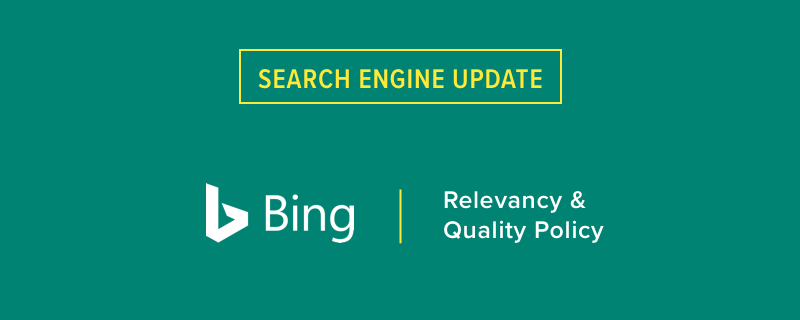On August 7th, 2017, Bing Ads updated its Relevancy and Quality Policy, adding a new System Quality Policy to “enhance a positive user experience by delivering improved ad and network quality.”
The policy provides Bing Ads the ability to limit or remove keywords and/or ads from its platform that have not shown any performance over a significant period of time. In addition, advertisers subject to the policy may see additional restrictions within ‘sensitive categories,’ including: weapons, pharmaceuticals, gambling, adult, and trademark.
We were excited by Bing Ads’ announcement, particularly the additional protection it provides brand owners against irrelevant trademark use by third-party search advertisers. So, we decided to take a look to see what, if any, impact the policy change had on trademark bidding using the BrandVerity Paid Search Monitoring tool. We’ll talk about the results of that study later in the post.
Rules on Brand Bidding
While there are no restrictions against bidding on branded keywords, third-party advertisers are prohibited from using brands’ trademarks in paid search ads in ways that infringe on those brands’ intellectual property rights, even if using dynamic text. Bing’s policy not only protects legal rights of trademark owners, it also promotes an accurate and high-quality advertising experience for its users.
At face value, the spirit of Bing’s trademark policy is clear. However, because branded keywords tend to have low cost-per-click and provide high click-through rates, they sometimes create a perverse incentive for advertisers to ‘search arbitrage’ by purchasing inexpensive ads in order to show other, higher-grossing ads on their landing page.
And though Bing prohibits pure search arbitrage, some advertisers have historically attempted to game the system. They do so by creating landing pages that primarily function to support ad monetization, while concurrently making the minimum investment in landing page quality to defensibly satisfy Bing’s policy and justify the use of third-party trademarks their search ads.
Policy Change
We interpreted Bing’s Relevancy and Quality Update to mean they are done splitting hairs over the subjective interpretation of their guidelines. The policy not only provides additional examples of low-quality landing pages that fail to meet their standard, they also reserve the right to institute “additional restrictions” against irrelevant trademark use. This effectively allows Bing to close historical policy loopholes, and provides the leverage and flexibility to ensure high network quality.
The Impact
To measure the effectiveness of Bing’s policy update we did some research using the BrandVerity Paid Search Monitoring tool. We analyzed Search Engine Results Pages (SERPs) resulting from brand-related keyword searches for the top 25 fashion retailers over the two-month period leading up to the August 7th policy change, as well as the two-month period following the change.
The results were conclusive: low-quality trademark use by third-party aggregator sites dropped by an average of 31% across all of the retailers we analyzed. On top of that already impressive statistic, BrandVerity clients included in the study saw irrelevant trademark use decline by nearly twice that amount.
We were thrilled, but not surprised, to see our clients outperform their peers and here’s why: while the policy update provides additional support for all trademark owners, those benefits are unlikely to be realized unless violations are brought to Bing’s attention. Because BrandVerity is the perfect tool to discover all instances of trademark abuse, as well as flag those violations to the search engines through our proprietary integration, our clients are able to fully leverage Bing’s new policy to protect their brands. We shared our study with our partners at Bing Ads, who were encouraged by the results:
"We are continuously reviewing and revising our policies to ensure a positive user experience that maintains ad and network quality. The system quality policy update in August is one example of our efforts to improve results for our advertisers and end users. We are pleased with the positive impact and reduction on the volume of irrelevant Trademark usage across our Bing network.”
Melissa Alsoszatai-Petheo, Advertiser Policy Manager
Conclusion
Bing Ads’ continued investment in network quality improvements is paying dividends to trademark owners and customers alike. Trademark owners and their authorized advertisers can expect to receive CTR increases that are inversely proportional to the reduction in irrelevant trademark use as a result of the new policy. Bing customers will enjoy interacting with higher quality ad and landing page content overall.
The network improvements clearly demonstrate Bing Ads’ commitment to brand protection, and trademark owners would be remiss not to take full advantage of the policy. While any trademark owner can submit a violation through Bing Ads’ trademark misuse form, only BrandVerity customers can automate their monitoring and protect their brand on a truly global scale.

